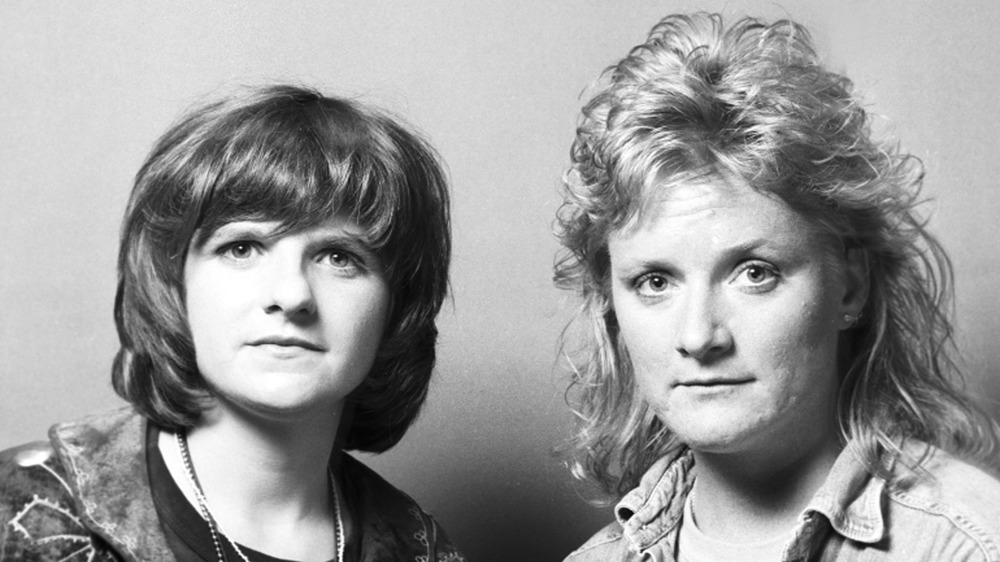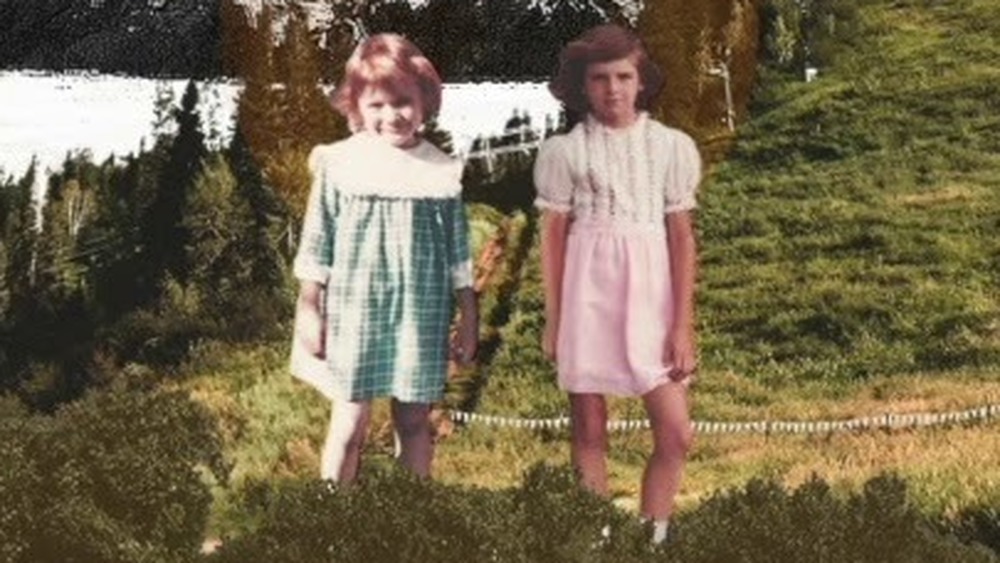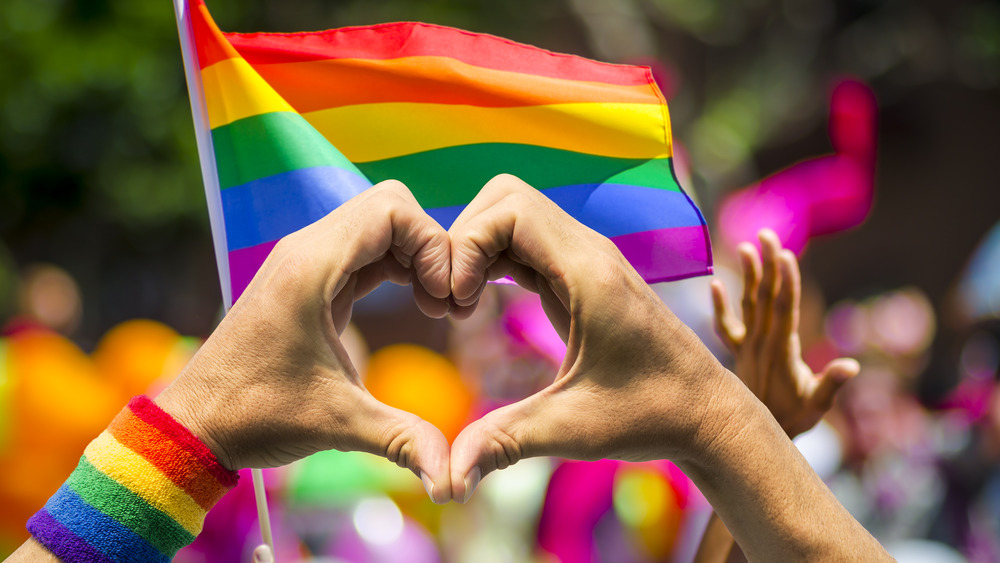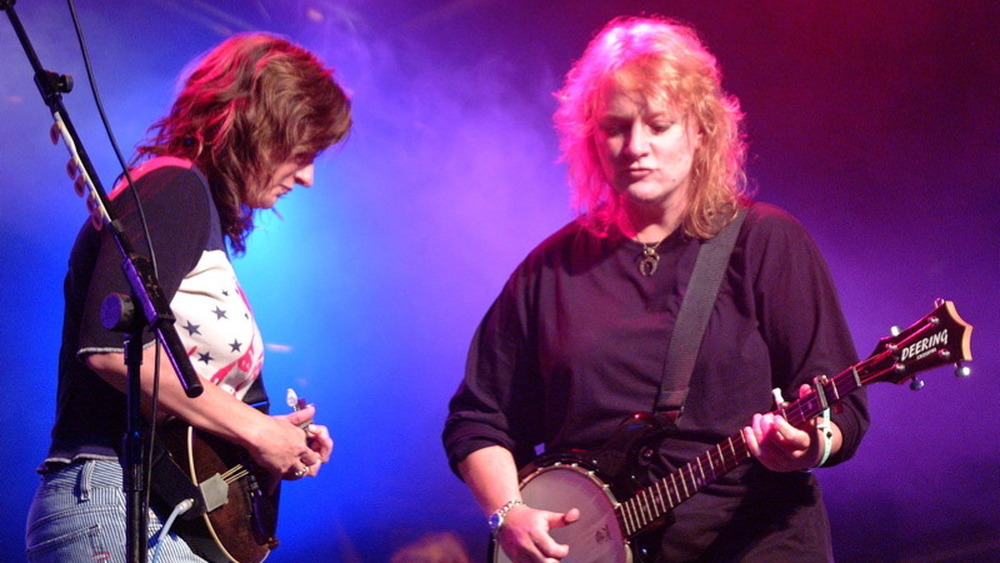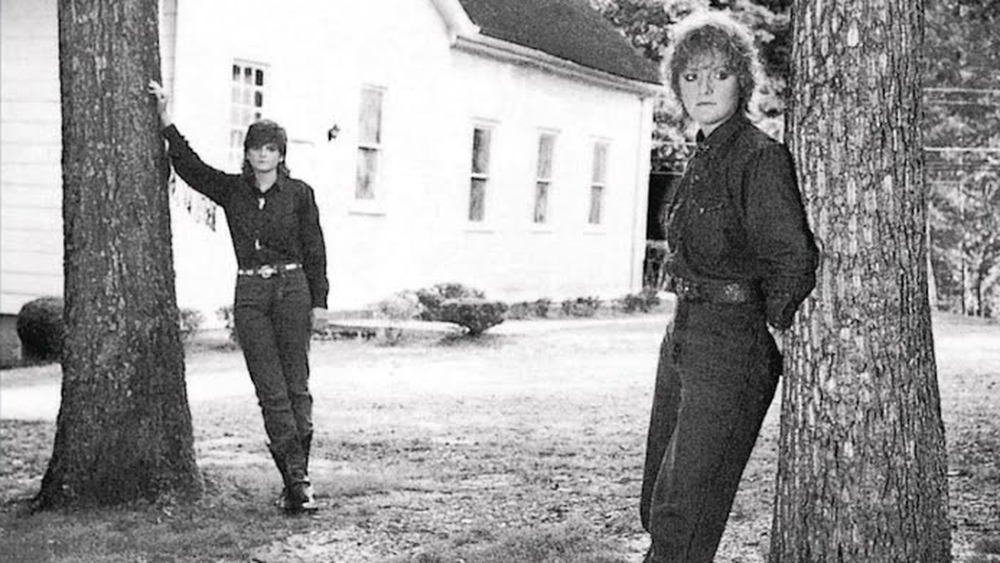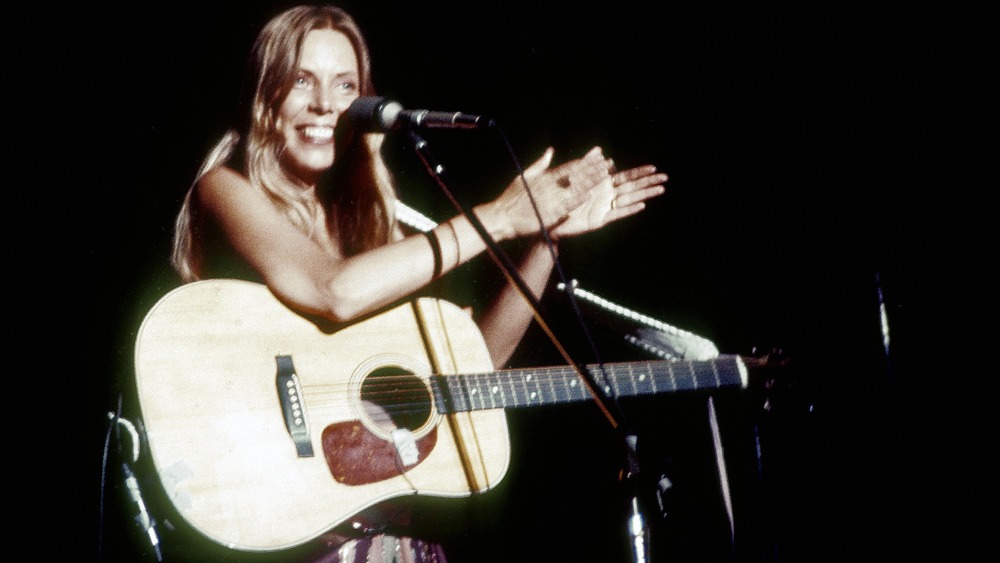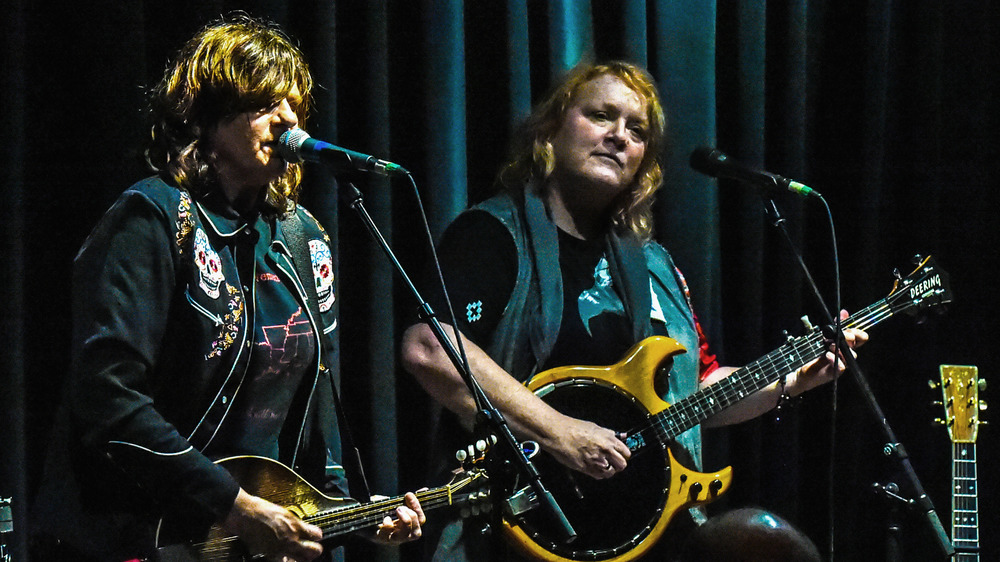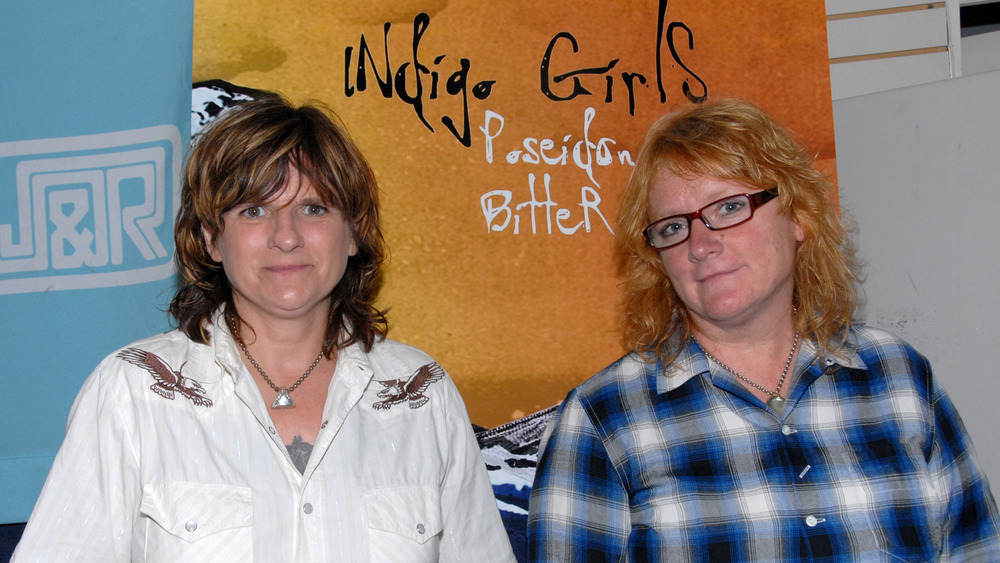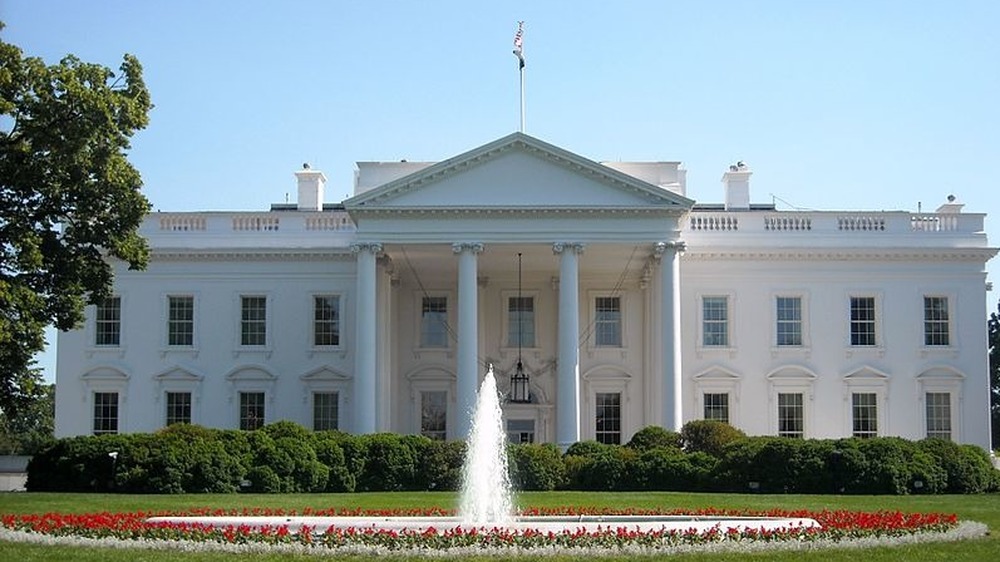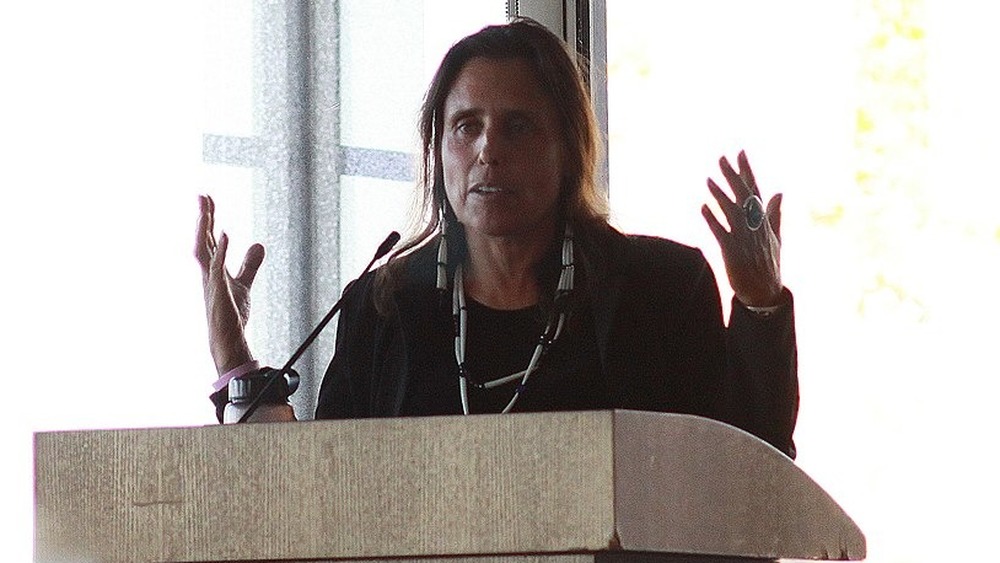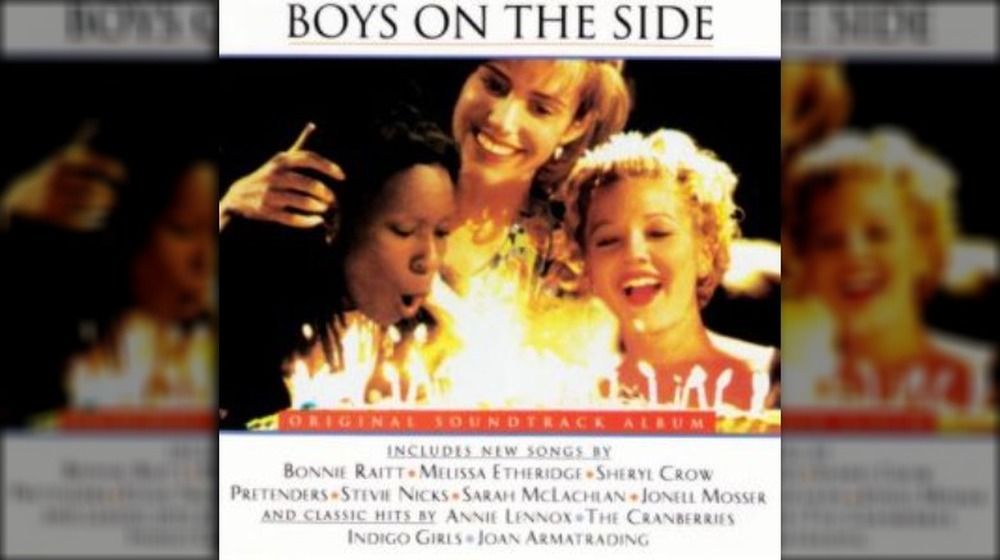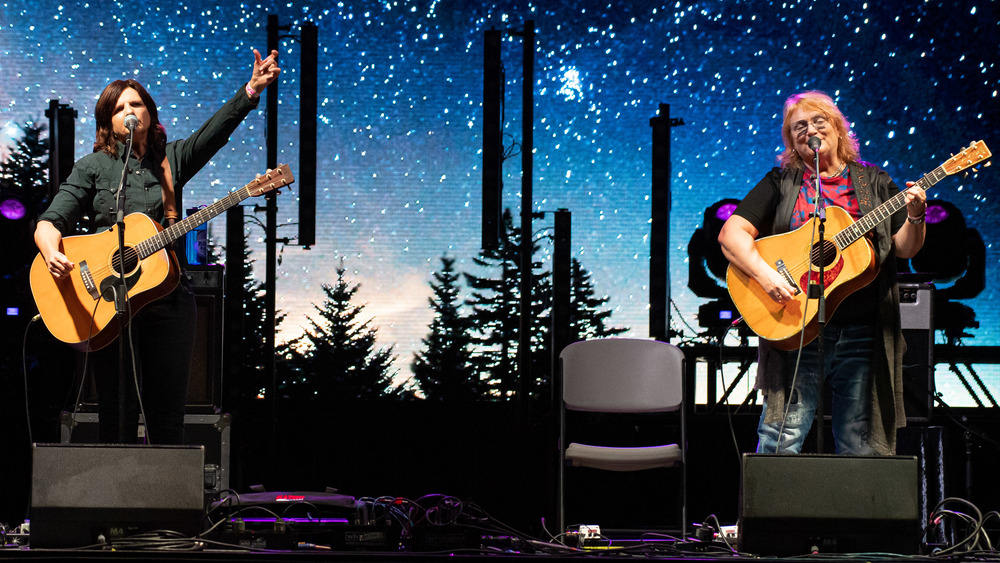The Untold Truth Of The Indigo Girls
We may receive a commission on purchases made from links.
In 1987, music lovers got a pleasing earful from an all-new folk band, the Indigo Girls. Formed by longtime friends Amy Ray and Emily Saliers, the Indigo Girls croon about life-changing epiphanies, gay rights, and politics, both together and separately. After officially forming the Indigo Girls in 1985, according to The Encyclopedia of Popular Music, the duet released their first album, Strange Fire, in 1987. Amazon reviewers give it a solid 4.9 out of five stars even now. And the band's newest album, Look Long, has received equally complimentary reviews, according to the Indigo Girls themselves. The Atlanta Journal-Constitution was spot-on when it declared that the twosome "remain one of the most consistent musical treasures in folk-pop."
To date, the Indigo Girls have been nominated for seven Grammy Awards, scoring one win in 1989 for Best Contemporary Folk Recording. Surely there are more to come, seeing as Ray and Saliers have made a serious impression on the gay community lo these past 35 years. NPR notes that the duo have given "many women a way to understand themselves along the lines of what the radical feminist poet Adrienne Rich called 'the lesbian continuum.'" As one might guess, there is plenty more than meets the eye about the Indigo Girls. Read on for the untold truth behind this iconic pair.
Amy Ray and Emily Saliers met in elementary school
Amy Ray and Emily Saliers go back a long way. They first met at Laurel Ridge Elementary School in Georgia, according to Atlanta Music magazine, although NPR explains that it wasn't until they were in the choir at Shamrock High School that the girls began singing together. Inspired by the likes of British modernist author Virginia Woolf and American poet Frank Stanford, the pair spent time honing their skills by learning cover tunes while writing their own songs.
In high school, says AllMusic, the girls first called themselves the B-Band. Upon graduating, both later attended Emory University in Atlanta, according to Encyclopedia.com. Ray would later say that she was experiencing "increasing confusion and tumult within her soul," finding solace in creating music with Saliers. "As soon as I felt the way our voices sounded together," she later explained, "I was inconsolable, except by the music we would make." It was surely an amazing time as both young ladies came to realize that they definitely were not quite like other girls. In 2016, the release of their album Look Long gave the pair the chance to "tell their origin story," says the Indigo Girls' website, by "chronicling their personal upbringings."
Growing up different
According to the American Psychological Association, being gay in the 1980s was no easy feat. Just two decades before, homosexuals were at risk of being jailed, ostracized by friends and family, losing their jobs, and being defined as mentally ill. Although the LGBT movement was underway, the AIDS epidemic cast an unhealthy shadow over the gay lifestyle as marches on Washington pleaded for compassion. Emily Saliers, says NPR, was raised by liberal parents who encouraged "deeper conversation about the social and political issues of the day." And although Amy Ray's family was "more politically conservative," she likely found solace in the fact that two of her siblings were also gay.
Over time, the Saliers and Ray would hope that being labeled a "lesbian duo" was a positive thing. "What we hope for is a day where that distinction doesn't matter and doesn't carry weight," Ray told the Huffington Post in 2016, but she was still waiting for a time when lesbianism would simply be a way to "celebrate diversity." These days, the band's website includes a whole section on activism, with support for everything from human rights to native and environmental causes, women's health, and LGBTQ support. AllMusic submits that the women's difference in personalities and music styles "provided tension and an interesting balance," thereby fueling the popularity of their songs.
The Indigo Girls are not a couple
Before we go further, let's make one thing clear: According to NPR writer Karen Tongson, Amy Ray and Emily Saliers "are not, nor have they ever been, romantic partners." Tongson also expressed surprise at how many people presumed that the musicians had at least dated each other, which is untrue. "Just because we are gay," Tongson clarifies regarding the homosexual community, "doesn't always make us gay for each other." The truth is that Ray and Saliers are both in long-term relationships — with other people. Ray has been with her partner, Carrie Schrader, since 2006, according to The Atlanta Journal-Constitution. In 2018, Schrader gave birth to a daughter: Ray explained that "I've wanted motherhood for a long, long time, so it was time."
As for Saliers, in 2013, Global News reported that the musician announced her marriage to Tristin Chipman, her partner of ten years. At the time, the couple also had a baby. The two married in New York State since at the time, gay marriage was illegal in Georgia. (Shaw Law confirms that gay marriage finally became legal there in 2015.) No matter the Indigo Girls' relationship status, Ray made it clear to the Huffington Post that, "We're proud of who we are and what our identity is, and we're going to make the best music we can and we don't want to be held back by a label that implies mediocrity or something."
The debut of the Indigo Girls
There are no hidden meanings as to why Emily Saliers and Amy Ray renamed their band the Indigo Girls. Everything2.com explains that Ray simply found the word "indigo" (defined as "a deep reddish blue") and "thought it sounded 'cool.'" Thus the name of the duo went from the B-Band, to Saliers and Ray, to the Indigo Girls, according to The Encyclopedia of Popular Music. Under their new moniker, the pair continued playing local clubs, performing their favorite cover songs by popular artists of the day, says NPR. But they were also writing songs, leading them to create their own record label in 1985, according to Oldies.com. They called it J. Ellis Records, after an English teacher on whom both had a crush.
One gig in particular proved to be a pivotal point for the Indigo Girls. At the Little 5 Points Pub in Atlanta in 1986, the ladies formed their first benefit show, "Songs for Shelter." The performance increased the band's popularity, as well as their support of "social justice causes." In 1987, writes John Malkin in his book Sounds of Freedom: Musicians on Spirituality & Social Change, the band self-produced their first full-length album, Strange Fire. The LP fueled the Indigo Girls' career further, but Encyclopedia.com quotes Ray as saying, "We had so much to do, we were just falling apart." Signing with Epic Records in 1988 would relieve part of the strain.
The Indigo Girls, separate and together
The Indigo Girls' 1992 album, Rites of Passage, includes the song "Joking" with the lyric, "Forget about your ego, forget about your pride, and you will never have to compromise." Refreshingly, the egotism that is often prevalent among musicians (which musician Jason Tiemann confirms can prevent artists from achieving "the full potential" when collaborating with others) has never reared its ugly head where the Indigo Girls are concerned. The musicians explained to American Songwriter that they each write their own songs separately before meeting up "to see what they can make of the material as a team." Amy Ray says, "We each have veto power over our own songs. Whoever wrote the song is the person in charge at that moment."
Indeed, musicians coming together on the right music is a delicate balance — yet Encyclopedia.com quotes Rolling Stone's Jerry Guterman as saying the pair make "ideal duet partners," displaying "a sense of shared purpose." So when Emily Saliers' song "Closer to Fine," from their 1989 self-titled album, made Billboard's Top 100, it was a victory for both musicians. As of 2019, says Stereogum, the Indigo Girls album had sold around two million copies.
The Indigo Girls were inspired by others
We know that Amy Ray and Emily Saliers are both prolific songwriters, but who are/were their influences? Turns out, the singers who inspire the duo are as diverse as the color of the women's hair. In 2009, Saliers told American Songwriter that her inspirations include Joni Mitchell (pictured), but she is also motivated by the likes of Beyoncé as well as classic artists Jackson Browne, Public Enemy, and Stevie Wonder. Ray's list was more obscure, citing the band 1945, dance band The Crush, Washington state musician Danielle Howell, and The Clash's Joe Strummer.
As for what they write about, certainly the Indigo Girls' songs deal with the world of today. "We are always writing about social issues," Saliers told the Shelton Herald in 2015, explaining that the pair likes writing about "topical issues." Their 2020 song, "Muster," addressed the 2018 Parkland school shooting. "I just felt like we really screwed up, the adults right now," Ray told KCRW, "and we need to make it up to these kids." Naturally, the musicians also write about being gay. Saliers' recent song, "Country Radio," contains lyrics that show how being homosexual can be a lonely road to travel when one listens to songs meant for heterosexuals: "I'm just a gay kid in a small town, who loves country radio."
Dancing with record labels
Amy Ray and Emily Saliers aren't just talented musicians: They also have a head for business. When the duo signed on with Epic Records in 1988, according to Encyclopedia.com, they made sure to retain "artistic control." Nine albums later, says Business Live, they switched over to Hollywood Records, which Q-Notes says is owned by Disney. Whether that reflected on the label's decision to drop the Indigo Girls in 2007, according to the Spartanburg Herald-Journal, remains unknown. But it mattered little: Ray clarified that "it definitely didn't feel like a bummer. It felt like, 'OK, good. Now we can just sort of do our own thing and do our own kind of marketing.'" So they did.
Without missing a beat, the Indigo Girls soon had their own label, IG Recordings. Saliers noted that the twosome "realized that there was nothing benefiting us by being signed to a record label. It was extremely liberating to be independent again." Add that to Ray's other label, Daemon Records, and her release of her own solo albums, as noted by NPR, and here was one content band. Saliers also told Arts ATL that she now resents the "big labels that now are making all of the money off of streaming while so many artists who are struggling aren't seeing anything from that." And there is more: Ray founded her own nonprofit organization for musicians, while Saliers bought a restaurant and authored a book.
Going their own way, together
The Indigo Girls don't just spend time away from each other writing songs. They both have plenty of other projects to keep them busy when they aren't working with one another. There's Amy Ray's Daemon record label, which began in 1990, according to Spirituality & Health. And Emily Saliers will likely never forget when she and her father, theologian Don Saliers, co-promoted their book, A Song to Sing, A Life to Live: Reflections on Music as Spiritual Practice, at a United Methodist women's convention. Q-Notes says that certain church members called for cancellation of the event since Emily is gay. No way, she responded, telling the crowd, "I want to hang with the Methodists!" And after she sang an anti-war song, her father sang Psalm 139 to the crowd.
Ray, too, has produced her own projects, including nine solo albums and one single between 2001 and 2020. Saliers also produced her first solo album, Murmuration Nation, in 2017, according to NPR. Ray had nothing but praise for the effort, telling The Daily Progress that the album was "quite an accomplishment. It's kind of alternative folk; it's got beats." Meanwhile, the Indigo Girls were proud to be the only duo to have placed in the Top 40 charts every decade from the 1980s to the 2010s.
A voice for gay rights
It could be said that the Indigo Girls have fueled support for gay rights throughout their careers. Their debut album in 1987 seems to have emboldened the duo: Just a year later, according to Pride Source, they officially "came out." Amy Ray would later admit to the Anchorage Daily News that "We were scared in the '80s. [...] We were young and trying to figure it out." Figure it out they did, and before long, everyone knew the Indigo Girls were lesbians. And they were willing to "help people encountering the same issues." But being gay and publicly supporting being gay did not come easy for the Indigo Girls.
There was that time in 1998, for instance, when, according to Mother Jones, the girls were banned from playing local high schools after parents complained about their being lesbians. "First your feelings get hurt," said Emily Saliers in 2000, "and then you get pissed." And then you fight back, gently. Saliers told Gay City News in 2004 that she "wouldn't take up arms" but jokingly threatened to "lob a big ol' thing of tofu ham at the White House." But the biggest and best weapon the Indigo Girls have is their voices, both in their songs and in magazines like Out Front. Ray saluted President Barack Obama's support of gay marriage in a 2012 interview with the magazine, commenting, "It helps when you have such a strong visionary [...] He's effective in the way that we think about ourselves."
The politics of music
Presidential influence is indeed important to the Indigo Girls, along with a lot of other issues. Their website cites their dedication to numerous other causes, including the environment, the importance of independent media, justice and human rights, Native American concerns, voter education, women's health, and, of course, music and being queer. As early as 1990, The Baltimore Sun noted that the ladies "seem to pop up wherever there's a rally or a chance to make a political statement for a cause they support." Amy Ray justified that, commenting that, "There are so many problems that we don't feel like we can do enough." That would include publicly criticizing then-governor George W. Bush, says Mother Jones, for refusing convicted murderer Karla Faye Tucker's plea for mercy before she was executed in 1998.
The coolest part about the Indigo Girls' activism is their connections with the places they visit. Upon meeting Native activist and Green Party candidate Winona LaDuke (pictured) for instance, the duo came to support "indigenous activism" and respect how the Natives believe in "everything in balance" with consideration for generations of tomorrow. Today, the group continues to support "community work, fundraising and political organizing," according to NPR, which notes that such support has "been central to their approach to booking any of their tours." Emily Saliers told writer Karen Tongson that she and Amy Ray found playing benefits were "much more gratifying" than any other show.
The Indigo Girls in film
A question that bears asking is, with all they have done, how come the Indigo Girls haven't made more television and film appearances? Notably, they did perform "I Don't Want to Talk About It" for the 1993 movie Philadelphia, which Smithsonian Magazine says "was the first major studio film to face the AIDS crisis head-on." And Kissing Fingertips notes that the duo had a brief cameo in 1995's Boys on the Side. Then there was the obscure film Chasing Indigo in 2000, whose two lead characters stash some money on the Indigo Girls' tour bus and spend the rest of the movie chasing it down.
More curious is why the Indigo Girls have never appeared on Saturday Night Live, although they were spoofed in 2005 by comediennes Rachel Dratch and Amy Poehler, with an appearance by fellow musician Sheryl Crow. But although Amy Ray appeared on the soundtrack for The Amazing Spider-Man in 2012, plus a small slew of other lesser-known shows, appearances by the Indigo Girls are pretty sparse. Fans should fear not, however, for the pair began working on a long-awaited documentary about their band in 2020, says The Hollywood Reporter. The project was being directed by Alexandria Bombach, who planned to use "never-before-seen archival footage." Also, YouTube and the band's own Facebook page each have a decent smattering of official videos, live performances, and interviews.
On tour with the Indigo Girls
Check this out: As of May 2020, the Indigo Girls had performed 320 live concerts, says Concert Archives. Yet it's one thing to sound great on an album and quite another to sound great live — but the Indigo Girls can do both, and early reviews of their show reflected that. When Colorado writer and photographer Tim Van Schmidt saw them in 1989, he wrote that their "straight to the heart harmonies and impassioned delivery exhibited rare sincerity." And when he saw Amy Ray backstage, she kindly chatted with him before he was ousted by security.
Here's another surprise, too: In 2006, the Indigo Girls' website stated outright that fans were welcome to tape their shows (audio only, no video). Amy Ray and Emily Saliers also appeared on top of things when they performed before a COVID-cautious yet sold-out drive-in crowd in Atlanta in October 2020, even as Ray noted to The Atlanta Journal-Constitution, "This is not the way we thought we'd see Ameris (Bank) Amphitheatre." But even a pandemic can't stop this dynamic pair, who are planning more shows beginning in April 2021. Indeed, as concert promoter 1911 noted, the Indigo Girls always have (and probably always will) "amaze conventional pundits with their ability to grow and thrive no matter what the state of the music industry is at any given point."
